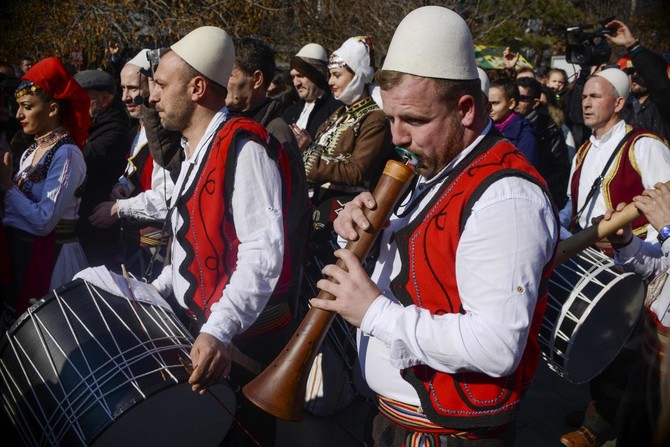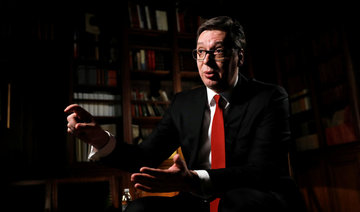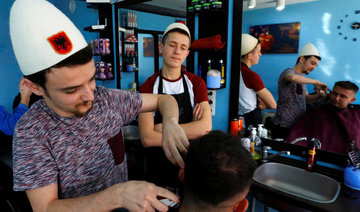PRISTINA: Kosovo, which celebrates 10 years of independence on Saturday, has a flag that few people care about, four international telephone codes and a judoka hero.
Here are five things to know about the youngest European country.
1. Kosovo’s flag bears the shape of its territory and six yellow stars, for its six main ethnic groups, on a blue background. It is mockingly called a towel by members of Kosovo’s ethnic Albanian majority, who believe it was adopted largely to please Western patrons. The flag flown all over Kosovo is that of neighboring Albania — a black double-headed eagle on a red background. The American stars and stripes are also prevalent, owing to Washington’s strong support in Kosovo’s struggle for independence from Serbia. In the areas that are home to Kosovo’s ethnic Serb minority, the “towel” is rarely seen and instead, the Serbian flag dominates.
2. Owing to Serbia’s opposition to independence, three other countries’ dialling codes are in use in Kosovo: Serbia’s +381 for landlines plus Monaco’s +377 and Slovenia’s +386 for mobile phones. Kosovo was allocated +383 as its own code after striking a deal with Belgrade. This is already being used on the popular messaging app Viber and is due to be fully operational later this year.
3. Kosovo beat its big brother Albania to an Olympic medal during the country’s first appearance at the Games in Rio in 2016, when national heroine Majlinda Kelmendi took gold in judo. Kosovo uses sport as a diplomatic tool and gained admission to the International Olympic Committee in 2014 to the great displeasure of Serbia. It proudly celebrated skier Albin Tahiri, Kosovo’s lone athlete in last week’s opening parade in Pyeongchang and its first sportsman in a Winter Olympics.
4. Kosovo is home to around 1.8 million people but another 700,000 Kosovo Albanians are estimated to live abroad, mostly in Germany and Switzerland. The diaspora, which has its own ministry, sent some 620 million euros ($760 million) to Kosovo in the first 10 months of 2017, making it a major contributor to the functioning of the country, alongside international aid.
5. Some 95 percent of Kosovo Albanians are Muslims, but one of the Balkan region’s largest Roman Catholic cathedrals sits in the center of Pristina. Dedicated to Saint Mother Teresa, of ethnic Albanian heritage, the church is a symbol of gratitude to the West for supporting independence.
Five things to know about Kosovo as it celebrates 10 years of independence
Five things to know about Kosovo as it celebrates 10 years of independence

The Republican attempt to discourage Trump lawsuits has hit a big obstacle

- As Trump faces lawsuits nationwide, GOP lawmakers had sought to bar federal courts from issuing temporary restraining orders
WASHINGTON: Republicans have hit a roadblock in an effort that could deter nonprofits, individuals and other potential litigants from filing lawsuits to block President Donald Trump over his executive actions.
As Trump faces lawsuits nationwide, GOP lawmakers had sought to bar federal courts from issuing temporary restraining orders or preliminary injunctions against the federal government unless the plaintiffs post what in many cases would be a massive financial bond at the beginning of the case.
The proposal was included in the Senate version of Trump’s massive tax and immigration bill, but ran into trouble with the Senate parliamentarian, who said it violates the chamber’s rules. It is now unlikely to be in the final package.
Federal judges can already require plaintiffs to post security bonds, but such funds are commonly waived in public interest cases. The GOP proposal would make the payment of the financial bond a requirement before a judge could make a ruling, which critics said would have a chilling effect on potential litigants who wouldn’t have the resources to comply.
Senate Democratic leader Chuck Schumer hailed the parliamentarian’s ruling in a press statement and called the GOP effort “nothing short of an assault on the system of checks and balances that has anchored the nation since it’s founding.”
“But Senate Democrats stopped them cold,” Schumer said.
Lawmakers are running scores of provisions by the Senate parliamentarian’s office to ensure they fit with the chamber’s rules for inclusion in a reconciliation bill. The recommendations from Elizabeth MacDonough will have a major impact on the final version of the legislation.
On Friday, she determined that a proposal to shift some food stamps costs from the federal government to states would violate the chamber’s rules. But some of the most difficult questions are still to come as Republicans hope to get a bill passed and on Trump’s desk to be signed into law before July 4th.
Republicans could still seek to include the judiciary provision in the bill, but it would likely be challenged and subject to a separate vote in which the provision would need 60 votes to remain. The parliamentarian’s advice, while not binding, is generally followed by the Senate.
Republicans and the White House have been highly critical of some of the court rulings blocking various Trump orders on immigration, education and voting. The courts have agreed to block the president in a number of cases, and the administration is seeking appeals as well.
In April, the House voted to limit the scope of injunctive relief ordered by a district judge to those parties before the court, rather than applying the relief nationally. But that bill is unlikely to advance in the Senate since it would need 60 votes to advance. That’s left Republicans looking for other avenues to blunt the court orders.
“We are experiencing a constitutional crisis, a judicial coup d’etat,” Rep. Bob Onder, R-Missouri, said during the House debate.
Turkiye sandwiches and stealth: Preparing for B-2 bomber missions

- Pilots are trained to be cognizant of foods and how they slow or speed digestion — critical in an aircraft with a single chemical toilet
- The Air Force plans to replace the B-2 and B-1 fleets with at least 100 B-21 Raiders over the coming decades
WASHINGTON: Before strapping into the cockpit of the US Air Force’s B-2 Spirit stealth bomber for missions that can stretch beyond 40 hours, pilots undergo weeks of preparation that focuses not only on flight plans, but what to eat.
The B-2, a $2 billion flying wing built by Northrop Grumman , played a key role in delivering strikes on Iran’s nuclear sites on Saturday. It demands extraordinary endurance from its two-person crew. That starts with understanding how nutrition affects alertness and digestion during intercontinental flights that can span nearly two full days.
“We go through sleep studies, we actually go through nutritional education to be able to teach each one of us: one, what wakes us up and then what helps us go to sleep,” said retired Lt. Gen. Steve Basham, who flew the B-2 for nine years and retired in 2024 as deputy commander of US European Command.
Pilots are trained to be cognizant of foods and how they slow or speed digestion — critical in an aircraft with a single chemical toilet. Basham’s go-to meal: turkey sandwiches on wheat bread, no cheese. “As bland as you possibly can,” he said.
With a 172-foot (52.4 m) wingspan and stealth profile, the B-2 can fly 6,000 nautical miles without refueling, but most missions require multiple mid-air refuelings. That process becomes increasingly difficult as fatigue sets in.
Refueling is done blind — pilots can’t see the boom extending from a tanker full of gas attaching to the B-2 16 feet behind their heads. Instead, they rely on visual cues from the tanker’s lights and memorized reference points. At night, especially on moonless flights, the task becomes what Basham called “inherently dangerous.”
“Adrenaline kept you going before you went into country,” he said. “The adrenaline goes away. You try to get a little bit of rest and you still got that one last refueling.”
The B-2’s cockpit includes a small area behind the seats, where pilots can lie down on a cot. Sunflower seeds help some stay alert between meals.
Despite its cutting-edge design — features that make it stealthy reduce infrared, radar and acoustic signatures — the B-2’s success hinges on human performance. The aircraft’s two-person crew replaces the larger teams required for older bombers like the B-1B and B-52, placing more responsibility on each member of the flight crew.
The B-2’s fly-by-wire system, which relies entirely on computer inputs, has evolved since its 1989 debut. Early software lagged behind pilot commands, complicating refueling, Basham said. Updates have improved responsiveness, but the challenge of flying in tight formation at high altitude remains.
During Operation Allied Force in 1999, B-2s flew 31-hour round trips from Missouri to Kosovo, striking 33 percent of targets in the first eight weeks, according to the Air Force. In Iraq, the aircraft dropped more than 1.5 million pounds of munitions across 49 sorties.
The Air Force plans to replace the B-2 and B-1 fleets with at least 100 B-21 Raiders over the coming decades. The B-2 costs about $65,000 per hour to operate, compared to $60,000 for the B-1, Pentagon data shows.
“Our pilots make it look easy, but it’s far from easy,” Basham said. The B-2’s complicated missions can’t be done “without a massive, massive array of planners on the ground throughout the world and maintainers that make sure you’ve always got a good aircraft.”
Supreme Court allows Trump to restart swift deportation of migrants away from their home countries

- Since some countries do not accept US deportations, the administration has reached agreements with other countries, including Panama and Costa Rica, to house them
WASHINGTON: A divided Supreme Court on Monday allowed the Trump administration to restart swift removals of migrants to countries other than their homelands, lifting for now a court order requiring they get a chance to challenge the deportations.
The high court majority did not detail its reasoning in the brief order, as is typical on its emergency docket. All three liberal justices dissented from the order.
It came after immigration officials put eight people on a plane to South Sudan in May. US District Judge Brian E. Murphy in Boston found that violated his court order giving people a chance to argue they could be in danger of torture if sent away from their home countries.
The migrants from countries including Myanmar, Vietnam and Cuba had been convicted of serious crimes in the US and immigration officials have said that they were unable to return them quickly to their home countries.
Authorities instead landed the plane at a US naval base in Djibouti, where the migrants were housed in a converted shipping container and the officers guarding them faced rough conditions even as immigration attorneys waited for word from their clients.
The case comes amid a sweeping immigration crackdown by Republican President Donald Trump’s administration, which has pledged to deport millions of people who are living in the United States illegally.
Since some countries do not accept US deportations, the administration has reached agreements with other countries, including Panama and Costa Rica, to house them. South Sudan, meanwhile, has endured repeated waves of violence since gaining independence in 2011.
Murphy’s order doesn’t prohibit deportations to third countries. But it says migrants must have a real chance to argue they could be in serious danger if sent to another country.
The justices have confronted a similar issue in Trump’s effort to send Venezuelans accused of being gang members to a notorious prison in El Salvador with little chance to challenge the deportations in court.
In that case, the court said migrants must get a “reasonable time” to file a court challenge before being removed, and the majority blocked the administration from resuming the deportations while lower courts worked out exactly how long they should get.
The conservative-majority court has sided with Trump in other immigration cases, however, clearing the way for his administration to end temporary legal protections affecting a total of nearly a million immigrants.
The third-country deportation case has been one of several legal flashpoints as the administration rails against judges whose rulings have slowed the president’s policies.
Another order from Murphy, who was appointed by President Joe Biden, resulted in the Trump administration returning a gay Guatemalan man who had been wrongly deported to Mexico, where he says he had been raped and extorted. The man, identified in court papers as O.C.G, was the first person known to have been returned to US custody after deportation since the start of Trump’s second term.
US hit by first extreme heat wave of the year

- Heat records tumbled across parts of the US Northeast, including in Central Park, known as the lungs of Manhattan, where Monday’s temperature of 96 degrees broke a record that had stood since 1888, according to the National Weather Service
NEW YORK: A potentially life-threatening heat wave enveloped the eastern third of the United States on Monday impacting nearly 160 million people, with temperatures expected to climb to 104 degrees Fahrenheit (40 degrees Celsius) in the New York metropolitan area.
The country’s first significant scorching heat of the year arrived over the weekend and peaks Monday and Tuesday in Washington, Baltimore, Philadelphia and New York City.
“This extreme heat will not just be uncomfortable and oppressive for New Yorkers,” warned Mayor Eric Adams, adding that each year heat claims the lives of 500 people in this city of eight million.
“It’s going to be brutal and dangerous if you do not treat it with the understanding that we want you to,” he added.
As sweltering heat enveloped the city, authorities urged seniors, people with health problems and those without air conditioning to stay hydrated and seek help at designated cooling centers such as libraries and recreation facilities.
Heat records tumbled across parts of the US Northeast, including in Central Park, known as the lungs of Manhattan, where Monday’s temperature of 96 degrees broke a record that had stood since 1888, according to the National Weather Service.
“Extreme Heat Warnings and Heat Adviseries across much of the eastern third of the country (are) affecting nearly 160 million people” across at least 29 states, the NWS reported.
“This level of HeatRisk is known for being rare and/or long duration with little to no overnight relief, and affects anyone without effective cooling and/or adequate hydration,” the agency warned.
Meteorologists are describing the intensifying weather pattern as a heat dome, a high-pressure system that traps air and leads to steadily rising thermal readings.
For many in the Big Apple, avoiding work in the searing heat was not an option.
“We have to endure it, because otherwise what are we going to survive on?” Manuel, a manual worker repairing a building facade in New York’s Harlem neighborhood, told AFP.
“Sometimes we stop because it’s a danger. We don’t all have the same energy, but you have to endure,” he added.
In the Washington Heights neighborhood, authorities opened several fire hydrants so residents could seek relief with the gushing water.
One of the local heroes was Ronald Marcelin, a 44-year-old air conditioning technician sweating profusely as he repaired a pizzeria’s AC unit.
“I’m taking the heat so that everyone else can cool down,” Marcelin said with a grin.
The soaring temperatures come just as New Yorkers head to the polls Tuesday for the Democratic primary that will decide the party’s mayoral candidate. This promises to be a tight race between Andrew Cuomo, who is seeking political resurrection after resigning in disgrace as state governor in 2021, and rising left-wing star Zohran Mamdami.
Over the weekend, Cuomo urged residents to cast their votes even if the temperatures hit 100 degrees Fahrenheit.
In Washington, the heat index — what the temperature feels like with humidity factored in — was forecast to soar to as high as 110 F on Monday, and the mayor’s office urged residents to take advantage of cooling centers.
Scientists say extreme heat waves are a clear sign of global warming, and they are expected to become more frequent, longer, and more intense.
Fueled by human-caused climate change, 2024 was the warmest year on record globally — and 2025 is projected to rank among the top three.
EU will not yield decision-making right in US tariff talks, says von der Leyen

- Her comments come amid speculation that Washington may be pressing Brussels into delaying the implementation of laws such as those on deforestation and online platforms or providing exemptions to US companies
BRUSSELS: The European Union will not give up its right to make policy decisions in negotiations with the United States to avert higher US tariffs on EU goods, European Commission President Ursula von der Leyen said on Monday.
“Of course, we discuss tariff lines, we discuss non-tariff barriers, like standards and norms. For example, we discuss strategic purchases, we discuss all these topics,” von der Leyen told a news conference after an EU-Canada summit.
“But where it is the sovereign decision-making process in the European Union and its member states that is affected, this is too far,” she continued, adding this was an “untouchable.”
Her comments come amid speculation that Washington may be pressing Brussels into delaying the implementation of laws such as those on deforestation and online platforms or providing exemptions to US companies.





















